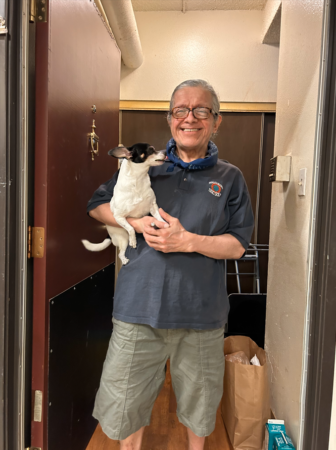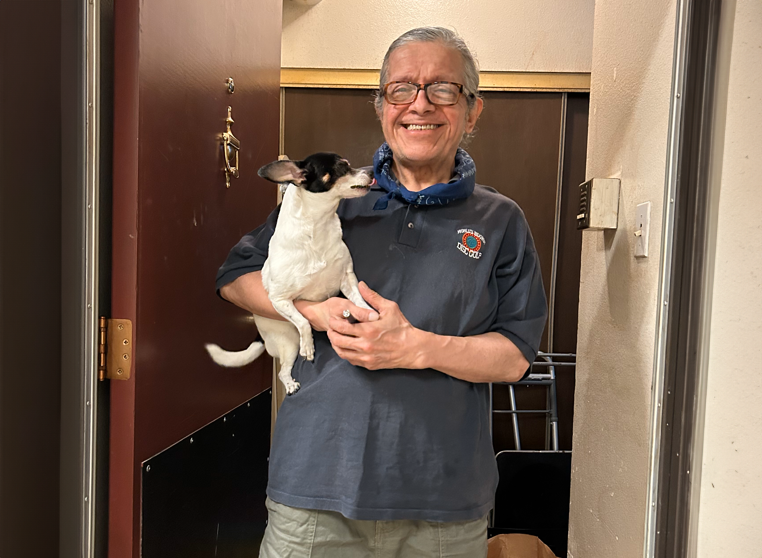David’s life story is filled with unexpected twists and turns. From the heights of disc golf fame to the depths of homelessness, he’s navigated some of life’s toughest challenges. Find out how his vision for inclusivity on the course translated into finding support and community through Meals on Wheels People.
If you called Portland’s Parks & Rec department in the 1990s to ask about disc sports, the person on the other end of the line would have given you David’s phone number. An advanced masters disc golf champion in the northwest who earned invitations to five world championships, David designed and installed the first officially sanctioned disc golf course in Oregon State Parks. In 2021, the course at Milo McIver State Park in Estacada was named one of the world’s Top 10 disc golf courses — there are over 14,000 disc golf courses in the world — by UDisc, an app for disc golfers.
“Some people design courses to intentionally be for the elite,” David says. “My goal was to make this course for everyone.”
David’s vision was inclusive. He didn’t just aim to create a playground for the professionals. He wanted a course that welcomed everyone, a place where beginners could learn and the elite could excel. “It’s now a disc golf mecca.”
But life, much like the unpredictable trajectory of a disc, took a sudden turn.
Trials Off the Course
In 2006, his divorce led to a cascade of difficulties that upended everything he had worked for. His triumphs on the disc golf course seemed a distant memory as he grappled with a heart-wrenching separation. The agony was so profound that, David confesses, “I spent some time wanting to die.” Health challenges added to his ordeal. A severe case of diverticulitis, compounded by a hernia, led to a life-threatening situation.
Then David became homeless. Seeking shelter in hidden spots and hustling to gather cans and bottles to scrape together money, he grappled with uncertainty, fear, and the daily struggle for survival.
He had been camping at a business after employees had gone home from the night. Every morning, he would pack up all his belongings and move out before they returned. One particularly harsh winter weekend, a heavy snowfall blanketed the area. The bike trailer he relied on for transportation and storage was completely buried in the snow. The cold was intense, but David knew he had to act quickly or risk discovery by the business owners. Ignoring the biting cold on his bare hands, he painstakingly dug his bike out of the deep snow. By the time he was finished, he was so exhausted and chilled that he could only make it half a block before collapsing.
“I wanted to lay down in the snow and fall asleep,” David recalls. “I was ready to do that.”
In the depths of despair, a lifeline emerged. A car pulled up and asked if David wanted help. “It was difficult for me to admit I needed help,” he says. “But I realized there are people who do care. I wasn’t alone.
“She saved my life,” David says. “That started me on a path to recovery.”
Serving Up Support

David and his dog, Birdie
Struggling with a fixed income of just $850 a month, David found it increasingly difficult to put food on the table.
“I have a cat and a dog, and I’m always making sure they get fed and taken care of first,” he says. “I was having a hard time getting food.”
That’s when David learned about Meals on Wheels People through his next-door neighbor. His neighbor was receiving meals from MOWP, and David realized that this could be a lifeline for him, too.
“As soon as I pay my bills, I don’t have much money,” David says. But Meals on Wheels People offered a solution. Nutritious meals delivered to his doorstep meant that he could focus on rebuilding his life rather than worrying about his next meal.
For David, MOWP is more than just a meal delivery service; it’s a symbol of the community’s support, a tangible reminder that he’s not alone in his journey back to stability and joy.
“Sometimes they’re the only people I get to talk to,” David says, his voice filled with gratitude. “I really like that I get a [Friendly Chats] phone call as well. I know I can call if I need help for other things, too.”
During the pandemic, when isolation became the norm, Meals on Wheels People was there for David. When he fell seriously ill with the flu, his neighbors avoided him. He needed help, he needed Tylenol, but help seemed out of reach.
That’s when his volunteer delivery driver, Debra, stepped in. She reached out to the manager from the Elm Court Center, and together, they made sure David got the Tylenol he needed.
“I was so happy,” David says. “Thank God for Meals on Wheels.” His gratitude goes beyond the physical relief the medication provided. It’s about the empathy, the effort, the fact that people were willing to go the extra mile for him.
The connection between Meals on Wheels People and David’s past life in disc golf is profound. Just as he designed disc golf courses to be accessible to everyone, Meals on Wheels People reaches out to those who most need support, regardless of their circumstances. From designing spaces of inclusivity to finding inclusion himself through Meals on Wheels People, David’s life has come full circle.
Help Feed Those in Need
Your support can be the lifeline for many others seeking hope in challenging times. Donate now, and be a part of this incredible community, making a difference one meal at a time. Let’s come together and ensure that no one goes hungry or feels alone. Together, we can make a difference.

